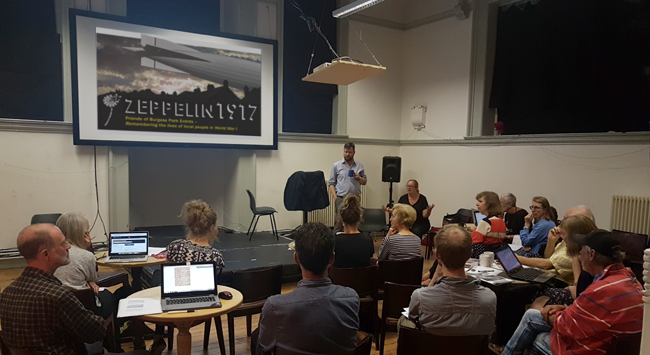A very fascinating introduction to researching archives took place on 22nd August at the Theatre Delicatessen space in the old Wells Way Library. This was the first of several get-togethers for anyone who wants to help research the story of the Zeppelin raid over Burgess Park in October 2017.
Led by Alan Crookham, head of Library and Archives at the National Gallery and Jane Ruddell, historian/archivist from the Mercers’ Company archives, we had a wide-ranging discussion on what type of material is held by different archives, and how to access it. As a complete beginner myself, it was great!

We learnt about the different types of archives around the UK, and the sort of material they may have connected to the Zeppelin raid:
- The National Archives (TNA) – all government departments, plus loads more – use Discovery to search the catalogue, which also includes other UK archives
- The British Library – national newpaper collection, maps, sounds, plus much more. There’s several different catalogues or use Explore
- University archives – many universities hold specialist material in their own archives – for instance, the TUC collection at the Univerity of Warwick. See Archives Hub, or their combined catalogue for published material, or AIM25 for institutions inside the M25 London area
- National and smaller museums usually have large archive collections, for example the Imperial War Museum, National Gallery and Tate. The IWM is of particular interest to us
- County/borough archives for local material, including the local authority. Especially relevant here is our own Southwark Local History Library and Archives, and the associated Cuming Collection, who we’ll be meeting with shortly.
- AIM25 is a portal giving access to various London archives, including the London Metropolitan Archives, which covers the whole of the London region formerly governed by the London County Council and the GLC.
- Many private collections exist, such as London Livery Companies (including the Mercers’ Company), historic houses, etc.
- Business archives, useful for information about products and inventions, but the smaller ones may have little or no online presence, or arrangements for access
Apparently, many archives have very little that is digitised and easily available online, but many of them have catalogues which can be looked on their websites, so you know where to go to find out the detail. The TNA Discovery site is a great place to start to uncover many of these archives, together with Archives Hub.
Understanding the way different archives classify their material is important in getting to grips with what they contain. Page 11 of the powerpoint from the night (see link below) has a useful example from the National Gallery. These archival classification systems are designed to preserve the context of the item in the collection, as well as the item itself, so you can see its relationship to other items.
The catalogue numbers or ‘shelfmarks’ referring to particular documents in a collection are vital to record during a visit, so you can go back and ask for the document again, or you can pass on details to other researchers. It’s really important to record the catalogue reference for everything you find useful, and even for things which may not seem so useful at the time.
Top Tips for getting the most out of your visit:
- Define your topic clearly before you start
- Find out which are the relevant archives, and what sort of documents you could expect to find
- Check the description of their holdings or collections
- Search the catalogues online as far as possible before visiting – even order the items to be viewed in the archive online before visiting
- Check what documents are needed in order to register for a reader pass and take them along on your first visit
- Phone ahead for clarification, if need be
- Plan your visit – opening times, document delivery times (may be up to several days after ordering!), restrictions on access, photography/photocopying arrangements and cost
- Take a camera (most archives now allow photos for own research purposes)
- Take a pencil (no rubber!) not a pen, magnifying glass, laptop
Consider and ask the archivist about copyright, before publishing any item by whichever means.
Check out the Powerpoint from the night here:
We’re still looking for volunteers, so check the contact details here and come along to the next session on 31st August 2017!